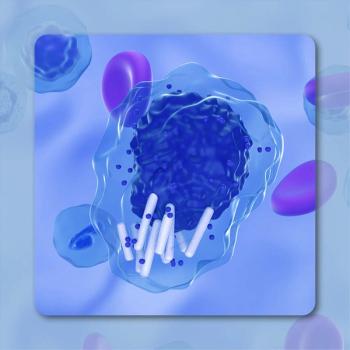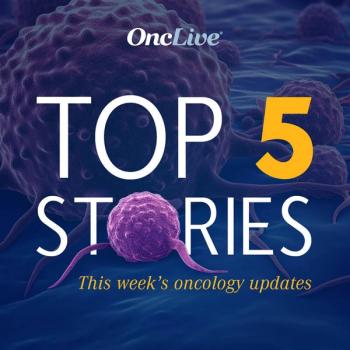
Europe’s Largest Prospective Dataset Confirms Cancer’s Correlation With COVID-19 Mortality
Cancer is independently associated with mortality in patients admitted to the hospital due to coronavirus disease 2019 (COVID-19) infection.
Cancer is independently associated with mortality in patients admitted to the hospital due to coronavirus disease 2019 (COVID-19) infection, according to data from The Clinical Characterization Protocol UK (CCP-UK) study, organized by the International Severe Acute Respiratory and emerging Infections Consortium (ISARIC) and COVID-19 Clinical Information Network (CO-CIN).
Insights from the CCP-UK study (ISRCTN66726260), which comprises Europe’s largest prospective dataset, included 66,594 patients in the United Kingdom (UK) with complete outcomes, 10.5% of whom had cancer, 2.5% of whom were receiving active treatment for their cancer, and 8.0% of whom had a history of cancer upon data extraction on August 17, 2020.Data made available at the virtual 2020 ESMO Congress showed that, at the time of the presentation, 44.3%, 42.3%, and 29.5% of patients with a history of cancer, patients receiving anti-cancer therapy, and patients without cancer or a history of cancer had died, respectively.
In line with these findings, additional results demonstrated a “significantly higher” 30-day mortality rate among patients with cancer compared with patients who did not have cancer, according to Carlo Palmieri, BSc, MB, BS, PhD, FRCP, who presented the findings (40.5% vs 28.5%; unadjusted HR, 1.62; 95% CI, 1.56-1.68; P <.001).
When stratified by age, 30-day mortality was consistently higher in all age-specific subgroups of patients with cancer versus patients without cancer. Among the 4 age-defined subsets studied—less than 50 years; 50 to 69 years; 70 to 79 years; and older than 80 years—30-day mortality was highest in patients with cancer in this last group (46.8% vs 42.5%, no cancer).
“The hazard ratio was highest in patients [younger] than 50, at 4.09, and lowest in patients [older] than 80, with a hazard ratio of 1.17,” said Palmieri, a professor of Translational Oncology and medical oncologist in the Department of Molecular and Clinical Cancer Medicine at the University of Liverpool’s Institute of Translational Medicine in England (95% CI, 2.99-5.60; P <.001 and 95% CI, 1.11-1.23; P <.001). “Although the older patients have the worst 30-day mortality outcomes, the greatest absolute differences were seen in the younger patients,” he added.
Indeed, the 30-day mortality rates and percent differences in patients with cancer compared with patients without cancer in the 2 youngest subsets were 18.7% vs 6.3% in patients less than 50 years, translating to a 12.4% difference; and 31.4% versus 18.4% in patients aged 50 to 69 years, equating to a 13.0% difference (HR, 2.00; 95% CI, 1.82-2.20; P <.001). In patients aged 70 to 79 years, the 30-day mortality was only slightly different, at 40.1% among those with cancer and 34.1% in healthy patients, representing a 6.0% differential (HR, 1.27; 95% CI, 1.18-1.37).
Despite the consistently elevated mortality rate observed in patients with cancer of all ages, “no clinically significant differences in symptoms” at COVID-19 presentation were observed in patients with cancer, Palmieri said. However, “significant differences” were seen with respect to admission to critical care and ventilation patterns between patients with and without cancer, he added.
For example, patients with a history of cancer (7.6%) or those actively receiving anti-cancer therapy (9.5%) were the least likely to be admitted to critical care versus patients without cancer or a history of cancer (14.6%). Interestingly, this trend continued in investigators’ analysis of invasive mechanical ventilation use, where patients without cancer had the highest rate of ventilation (8.9%). The ventilation rates in patients with a history of cancer and patients on active treatment were nearly identical, at 4.1% and 4.0%, respectively.
Age Guides Mortality Trends
As in the analysis of 30-day mortality, age remained a key distinguishing factor in a multivariable analysis of HR for mortality adjusted for age, sex, chronic cardiac disease, chronic renal disease, and dementia. Patients younger than 50 years who had a history of cancer had an HR of 3.50 (95% CI, 2.31-5.31; P < .001). “Therefore, patients younger than 50 with a history of cancer are 3.5 times more likely to die from COVID-19,” Palmieri observed. The HRs for patients with a history of cancer in the other 3 age groups were 7.23, 9.73, and 11.17, respectively.
Among patients younger than 50 years receiving active treatment for their cancer, the HR was 4.86 (95% CI, 3.17-7.44; P <.001). In patients 50 to 69 years; 70 to 79 years; and older than 80 years, the HRs for active therapy were 8.54, 9.55, and 11.64, respectively. The “differences in the age groups appeared to decrease with age,” Palmieri said, citing the HRs for patients without cancer (10.07), a history of cancer (11.17), and patients on active treatment (11.64) older than 80 years, as an example.
In the multivariable analysis and in the assessments of critical care admission, ventilation use, death, and 30-day mortality, a lack of information about cancer type, stage, and treatments received represented a limitation, because details on cancer or type of therapy were not collected, Palmieri said.
CCP-UK
CCP-UK was activated on January 17, 2020 via the ISARIC and CO-CIN, and as of August 17, 2020, included 258 participating healthcare facilities sharing inpatient data. Through the CCP-UK, the ISARIC and CO-CIN sought to characterize the presentation, critical care admission, use of invasive mechanical ventilation and in-hospital mortality among hospitalized patients with cancer and COVID-19 and compare these outcomes to patients without cancer. CCP-UK is a multidisciplinary project developed to broadly characterize the presentation and course of COVID-19 in patients with cancer to inform and subsequently improve practice.
The August 17, 2020 pool of CCP-UP patient data included those who were hospitalized with a confirmed SARS-CoV-2 infection from January 17, 2020 onwards, and excluded individuals who were registered to CCP-UK fewer than 14 days before data extraction. The inpatient data were collected across sites in the UK using a questionnaire adopted by the WHO. Patients with malignant neoplasm were also withheld from this main dataset following their identification via a case report form (CRF) used to select patients with malignant neoplasm. A history of cancer was considered a comorbidity on this CRF.
In April 2020, the CRF was amended on the subject of “active treatment” to record patients receiving chemotherapy, immunotherapy/an antibody treatment, or targeted therapy; patients who underwent a bone marrow or stem cell transplant in the past 6 months; patients with lung cancer who received radical radiotherapy for lung cancer; and patients with hematological malignancies at any stage of treatment. Although cancer type, stage, and therapies received were not included in this analysis, a companion study will collect additional data, including tumor type, treatment, the timing of treatment to COVID-19 episode, and long-term outcomes in an effort to quantify the impact of cancer and treatment type and the timing of relevant interventions on outcomes and escalation of care.
“In addition, the match cohort of patients without cancer within CCP-UK will enable us to carry out a matched cohort study, controlling variables,” Palmieri said. Controlled variables will include age, sex, ethnicity, and comorbidities. Additionally, biological samples collected as part of CCP-UK will support translational research on COVID-19 and cancer.
“We hope these data will inform policy makers, [encourage] better clinical decision making, and more importantly, enable our patients and their families to make proper decisions around treatment and societal interactions,” Palmieri concluded.
Reference
Palmieri C, Turtle L, Docherty A, et al. Prospective data of first 1,797 hospitalised patients with cancer and COVID-19 derived from the COVID-19 Clinical Information Network and international Severe Acute Respiratory and emerging Infections Consortium, WHO Coronavirus Clinical Characterisation Consortium. Presented at: 2020 ESMO Virtual Congress; September 19-21, 2020; virtual. Abstract 1670O.




































